During the Arab Spring in the Middle East and North Africa (MENA) in 2011, grassroots journalists in the region enjoyed a brief expansion in local reporting largely fueled by anti-authoritarian fervor and a populist zeitgeist. Once authoritarian regimes eventually regained control, however, this expansion was followed by crackdowns on dissidence which has continued to have a chilling effect on free speech in the region. Investigative journalism and the strength of the free press in the Middle East have been historically stifled. Nevertheless, the attitudes among Middle Eastern journalists can be broadly described as hopeful, but careful. An influx of foreign funding, new data collection and reporting techniques, a younger and increasingly connected audience, and the rise of social media have all been positive factors for journalism in the Middle East. However, there are still many challenges - old and new - that continue to plague this important institution.
One problem facing investigative journalists in the Middle East is that, in the wake of violent authoritarian crackdowns and sectarian strife, public dialogue has withdrawn from the more optimistic and thoughtful tone that it had during the Arab Spring, to one that is more reserved and careful. Rana Sabbagh, a Jordanian journalist who covered the Arab Spring, mentioned in an interview, "For them, democracy, free speech, and accountability equal anarchy and lack of security. They don't want to become like the Syrian, Libyan, or Yemeni refugees." The consequences for questioning corruption and overreaches of authority in the region are very clear and worrisome. There is very little press freedom in much of the Middle East; stories published by Arab journalists are often rejected by local news outlets and must be published elsewhere, such as in the United Kingdom or the United States. Investigative journalists covering controversial topics are often denied access to official data, such as lawsuits and audit reports, and must exploit back channels.
Investigative journalists are also often confronted with death threats and intimidation by authorities. In August 2016, Iraqi Kurdish journalist, Wedad Hussein Ali was tortured and beheaded by Kurdish security forces for publishing a story that was critical of Kurdish government. Iranian blogger Mohammed Reza Fathi was punished with 444 lashes because of an article that he posted espousing civil and social values that were contrary to those enforced by the regime. According to the Paris-based NGO, Reporters Without Borders (RWB), 19 of the 37 journalists killed in 2016 were in the Middle East when murdered. Many of these journalists are well aware of the dangers facing them and are still determined to spread awareness of corruption and malfeasance in their country/region.
Lina Atallah, former chief of the Egyptian Independent, was among the first to break the story of the Mubarack uprising in Egypt. Currently the editor-in-chief of MadaMasr, Atallah says she wants the press to "activate the conversation, to reopen the political space, and to engage the public in conversation." Increases in foreign funding for investigative journalism and the rise of popular outlets such as Al-Jazeera are part of a trickle of positive developments for the institution. However, in 2014, Egyptian President Abdel Fattah Al-Sisi issued an amendment that threatened life sentences for individuals who received foreign funding with the aim of "destabilizing the government". This, of course, was targeted at muckraking journalist organizations such as MadaMasr, many of whom would not be able to operate without foreign funding. Atallah noted the irony that the government of Egypt itself also accepts foreign funding.
I think that much of the repression that these journalists face is part of the broader problems of instability and sectarian conflict that plague the region. I believe that the bravery and persistence of these investigative journalists in the Middle East is a crucial ingredient for the region's growth and maturation. Lastly, I would argue that since investigative, data-driven journalism in the Middle East is intertwined with the region's economic, social, and political health, supporting this institution would be beneficial not only to people in the Middle East, but to the global community as a whole, given our increasing interconnectedness.
References:
- http://mediashift.org/2015/04/survey-on-media-use-in-middle-east-shows-a-return-to-the-local/
- http://www.themedialine.org/featured/press-freedoms-exist-middle-east/
- http://www.cjr.org/analysis/arab_investigative.php
- https://www.washingtonpost.com/investigations/after-arab-spring-journalism-briefly-flowered-and-then-withered/2015/07/25/cb4c43fe-1c2a-11e5-ab92-c75ae6ab94b5_story.html?utm_term=.938e5ef0af71


Really worrying issue these days. It took an almighty presidential pardon to release Al Jazeera reporters recently. And then again, in december 2016, another Al Jazeera worker was arrested in Egypt.
ReplyDeleteYour post was very well written and informative. I agree that we should support these journalists as much as possible. Even though they face insurmountable odds, these journalists carry the torch of truth and hope for their home region.
ReplyDeleteIf these governments and political groups actually believed their principles to be justified, they would not go to such ends to conceal their actions.
ReplyDeleteInteresting how authoritarian regimes always fight the press as much as they can and the current POTUS is doing the same to the American press
ReplyDelete-Steven Rayburn